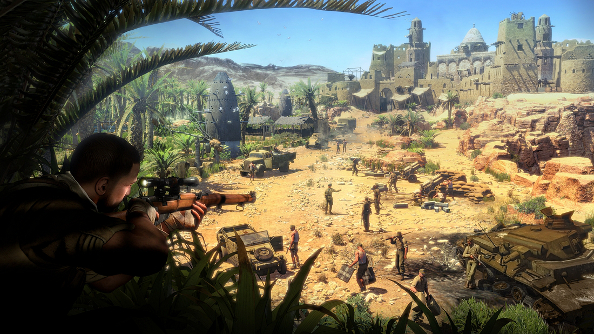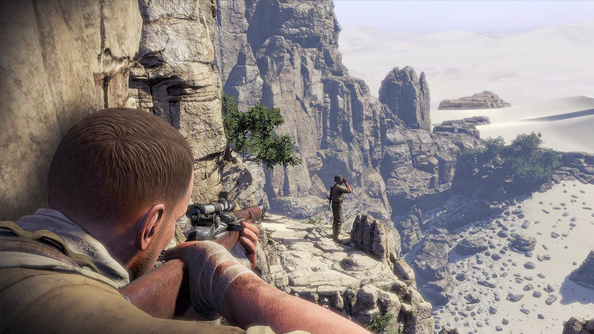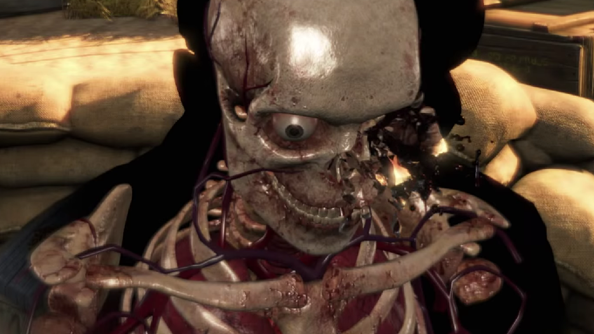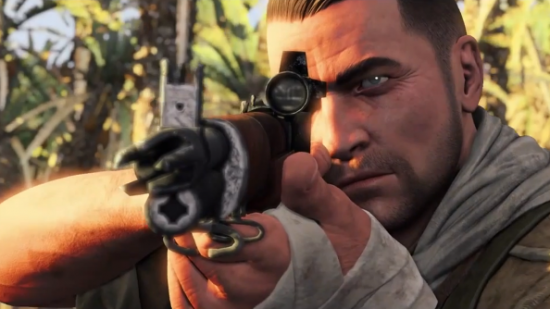It’s not Sniper Elite that’s the problem. It’s what I think I know about it.
I mean, the series is called Sniper Elite, for Chrissakes. Am I crazy for thinking it’s a game made just for those camping Oswald wannabes? The ones who ruin every multiplayer shooter because looking at the world through a set of crosshairs gives them a raging hard-on?
The bullet-porn doesn’t help, of course. When I make an appointment to see Rebellion’s Sniper Elite 3, I’ve yet to play a single minute of a Sniper Elite game. But I know exactly what it looks like when you put a round through a man’s testicles in this game. The slow-motion physical destruction of a human being, often with a helpful x-ray view to show bones splintering, has pretty much assured me that this is not My Kind of Game.
I know all this when I go to take a look at Sniper Elite 3. I know it even though I’ve never played so much as a minute of it.
Rebellion’s PR man, Robbie Cooke, is showing me Sniper Elite 3 at PAX East. I’m there as a courtesy. This is not my kind of game, and I’m shell-shocked by a month of GDC, PAX, and a brief side-trip into medical crisis. Besides, I already know what I think of Sniper Elite.
Cooke is my favorite kind of PR person. There’s no forced bonhomie here, and he doesn’t pretend that Sniper Elite 3 is unencumbered by baggage. When I hold up my hands saying, “No, why don’t you play and I’ll watch,” he knows the score. I’m another member of the games media who thinks he’s Too Good / Too Old for This Shit.
He just nods and launches into the level. “So have you played these games before, Rob?” he asks.
“No,” I say. He nods; he expected this. “A friend has been playing the hell out of Nazi Zombie Sniper, though. He just gifted me a couple copies, trying to get me into them.”
Cooke nods again, then gets back to steering his sniper through a rocky pass in North Africa. He stealth-kills a couple Germans, then pushes deeper into their base.
“You know, those [Nazi Zombie Army] games basically started out as a mod,” he says. “Now they’ve taken on this life of their own. I think more people know about them than the the core games. Which we have… mixed feelings about.”

From an overwatch position, Cooke is marking targets so that their positions will always be visible. It reminds me a bit of the binoculars in Far Cry 2, but the skullduggery and gritty Dirty Dozen vibe reminds me more of the old Commandos series. Cooke has yet to explode anyone’s brains. Nor has he just been put on a hill somewhere and told to murder a bunch of hapless victims from 300 yards away. This is not what I was expecting.
“All I really know about these games,” I admit, “is the bullet cam. I’ve seen a bunch of those videos where someone just gets destroyed in slow motion by a sniper shot.”
This gets a short sigh from my guide. “I think that’s all a lot of people know about our games,” he says. “Which is too bad. I actually think they’re really good stealth games… but nobody seems to know that. We’re having a bit of trouble getting the word out.”
This is a bitter truth of games marketing. Every game needs a hook, something that sets it apart from the crowd. That’s never more true than in shooters. It’s a genre that, from the outside, often looks like a hundred different flavors of vanilla. So you get dumber and dumber buzzwords and “features”. EA showed a guy opening a door in a Battlefield 4 trailer and called it Levolution.
Word of mouth only gets you so far and a lot of times, the distance is dispiritingly short. Marketers can’t trust it, even when the product is great. Too often, 2000 words on “You should know about this game, it’s a hidden gem!” ends up drawing fewer readers than a story about a new shooter patch.
So I get it. Sniper Elite is a slightly brainy stealth shooter than needed an easy hook. So here, fuckers, watch this dude get his dick blown off in slow-motion. Are you not entertained?
At the same time, though, there’s a bit of, “What did you think was going to happen?” You fetishize what a high-velocity slug does to the human body, people are you going to treat you like a pornographer.
There’s this tension around representations of gun violence. On the one hand I love games with good “weapon feel”. I want the act of firing a simulated weapon at a simulated human being to feel authentic. I will launch into long-winded anecdotes about a particularly impressive feat of marksmanship I pulled off in Red Orchestra 2.
But then there’s this: I am an American living in an era of routinized mass-shootings. Sniper Elite’s near-sexualized depiction of bullet-wounds can be wildly off-putting. There is a macabre fascination there, yes. But is there not also sadism?
That’s the thing: you try to harness shock, but nothing closes a mind faster than revulsion.
Quiet of the Grave
Flash back to late-winter. One of my closest friends, J.P. Grant, starts popping up on my steam list playing Sniper Elite: Nazi Zombie Army 2.
Nazi. Zombie. Army. 2.
They made two of these games.
JP’s wife once remarked over dinner that she married an English teacher who read Great Literature. Now he’s the head of a Warhammer 40K book club. It has only one other member: me. Yet somehow, I’m still surprised to see him spending his free time with Nazi Zombie Army. 2.
The thing about JP is that he’s a guy who can get a bit stuck in his own head. I think that’s why he’s become a connoisseur of crap. There is a craftsmanship, too easily underestimated, to making ridiculous fun escapism. Increasingly, JP is devoted to those things that succeed in killing that background noise of worry and anxiety that keeps most of us company.
That’s Nazi Zombie Army. JP gifts me a couple copies so I get what he’s talking about. They show up late one night with the admonishment, “Dawg, don’t even try to pretend you’re above this shit.”
I try to pretend that I am.
The things I collect reflect me, but also an idealized vision of myself. I still have a shelf devoted to Latin and Greek literature that I can barely read anymore. In the sitting room, there are books of poetry and literature and history with suspiciously uncreased spines. My Steam library is crammed with sims and indie games that make me feel ambitious and virtuous.
Things like Nazi Zombie Army 2 are things that I try to enjoy ironically. It doesn’t really count if I accept how stupid all of this is right at the start. I’m playing a game where zombies in SS uniforms shamble towards me, sporting helpful swastikas on their helmets just to reassure you that these guys were dicks even before they were zombified.
But something funny starts happening: I realize that Nazi Zombie Army isn’t just providing a distraction. It’s completely emptying my mind.
“You see now?” JP asks later, arching his eyebrows at me over the top of a glass of stout. We’re sitting in the back room of The Field in Cambridge, day-drinking and talking about the pains of late-youth. We’ve both both got back problems this week, and there’s an hour of work issues to talk through.
But God damn, does it ever feel good when you watch a bullet blast through one zombie and then straight into the head of another. We’ve got that going for us, at least.
“It’s kinda… meditative?” I spread my hands, almost apologetic. “Like, it’s surprisingly hard to land those head shots. And when I started playing it, I was screwing it up all the time because I was so frantic. But this game kills you for that.”
“But then you slowed down, right? And you start to get it a little bit,” JP says. “It’s a completely different rhythm.”
Nazi Zombie Army is not a hard game. It’s challenging enough to require focus, but not so difficult enough that it edges over into frustration. But its distinguishing feature is how it approaches movement. Every time you run around, it’s harder to steady your aim. You feel overwhelmed, you start to scurry around, spraying and praying, and pretty soon you really are overwhelmed.
But the longer you stay in one place, or if you move slowly and deliberately, your aim gets steadier and you build up lung capacity. Tap “e” and your sniper slowly releases his breath. Not only does your vision start to telescope, but time slows down. Everything goes quiet, like you’re hearing it from a distance through a wall of cotton. You hear your character breathing, his heartbeat drowns out the hordes. His aim steadies. You get an icon indicating where your shot will fall.
This is the key to survival. Go slowly. Do less. Feel nothing. Think nothing.
This is a silly game. But at the same time, it’s not.
“This is what I’m talking about,” JP assures me.

Hunter, Hunted
It’s not really what I was expecting, and neither is Sniper Elite 3. It is, in fact, a stealth game. It just happens to be one that doesn’t secretly hate you for not being 100% stealthy.
It’s more like Crysis, back when Crysis was good and ambitious. When the game was about being the Predator. In Sniper Elite 3, you’re not trying to be some kind of ghost commando. Your job is to mess up some Germans and their shiny equipment. You don’t do that by tiptoeing around the entire time. You pick your moment, and start the slaughter.
Nazi Zombie Army is all slaughter and all repetition. Sniper Elite 3 is more complicated than that. Once Robbie Cooke opens fire from his perch, the Germans are alerted… but not yet sure of what is going on. There is a brief window of confusion that you can use to notch a few more kills, or make good your escape.
Typically, the smart play is to run like hell. It’s a marathon, not a sprint. You didn’t see the Predator just go Leroy Jenkins on those commandos, did you? No, you didn’t.
You engage knock out your targets, then start sneaking to another position before anyone can nail down exactly where you are. Because the German guards are not totally clueless: they figure out your last-known position (represented by a ghostly image of your sniper, just so you don’t forget where they’ll be looking), and then they fan out around it. So the trick is continuous misdirection, being like Batman with an Enfield .303. Maybe a Frank Miller Batman.
When I finally say, “OK, let me try,” I realize a couple things. First, I’m not going to win a shoot-out here. If it comes down to trading shots with German riflemen, you’re doomed. There’s a dozen of them and one of you. Plus, they are constantly trying to flank and sneak up behind you. You can use fun little tricks, like landmines and trip-mines, to make sure anyone trying a sneak attack gets a nasty surprise. But those are precious resources, easily depleted, so most of the game comes down to your ability to strike from the shadows, then vanish.
And it’s here where I realize that the bullet cam actually serves a higher purpose than snuff-fetish. It’s a crucial break in the action, slowing things down and giving you a moment to just think about your next move without some asshole trying to put one through your eyeball. It also helps you get a view of what’s happening. You learn to watch what’s happening in the background as the bullet spins through the air, to see which guards are moving where. You settle down and start to plan your next move, your next kill, your next position…
And then someone’s head explodes.

Dialed-in
There is always a part of me that’s in a rush to disapprove. Sniper Elite and its bullet-cam was not what I envisioned when I decided to pursue games for a living.
So when I see a game that shamelessly embraces violence almost for its own sake, it’s like watching your puppy pee on the rug. “Oh, Videogames. How could you?”
The thing is, though, meaning is wildly subjective, and can take on many forms. The Sniper Elite series does not have a message waiting at the end. There’s no commentary about warfare or violence or even the particular power fantasy it sells. But there’s a refreshing purity of purpose at work here, married to a lack of pretence.
And that’s what gives it space to do something surprisingly rewarding. It becomes a game about a task, about maintaining a frame of mind, about setting everything else aside. And that includes the self, that anxious and distracted constant companion.
I didn’t like what I thought Sniper Elite was selling. I distrusted the view down a rifle scope. But now I realize that it brings things into focus on both ends. It’s a narrow circle of focused light, surrounded by a ring of darkness. You look to get a closer view, and the world disappears.
Suddenly, you hear your heartbeat.
